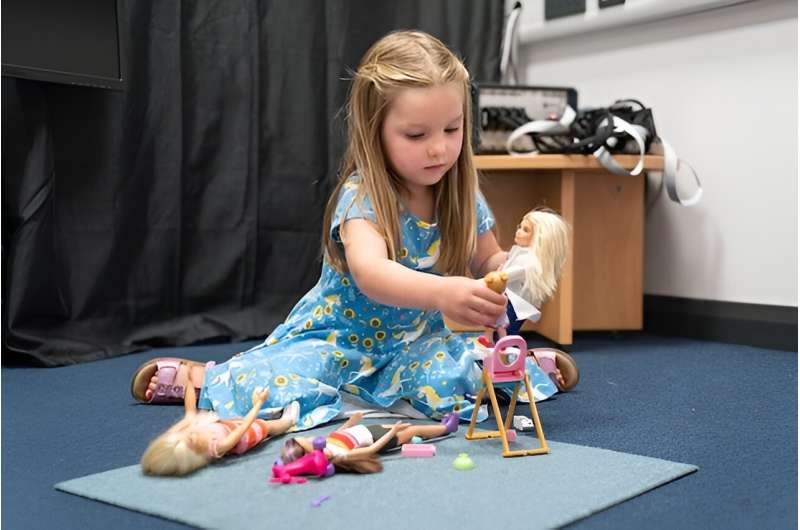Doll play allows children to develop and practice social skills regardless of their neurodevelopmental profile

Neuroscientists from Cardiff University have found that doll play could benefit children with varying social communication styles, including those who display neurodivergent traits commonly associated with autism.
Part of a long-term study commissioned by Mattel, researchers monitored the brain activity of 57 children aged 4 to 8 years with varying levels of autistic traits.
The team, led by Dr. Sarah Gerson, from Cardiff University’s School of Psychology’s Center for Human Developmental Science in collaboration with Dr. Catherine Jones, Director of the Wales Autism Research Center at Cardiff University, used state-of-the-art functional, near-infrared spectroscopy equipment to explore brain activation while children played with dolls and on tablets, both by themselves and with another person.
They found that doll play—either alone or in a group—is related to brain activity associated with social processing among children with and without high levels of autistic traits, albeit through different approaches to play.
The findings build on previous years’ research which suggest that playing with dolls activated parts of childrens’ brains involved in empathy and social processing skills; and that doll play helped children to talk more about others’ thoughts and emotions.
Dr. Gerson said, “Our study shows that doll play can encourage social processing in children, regardless of their neurodevelopmental profile. The findings suggest that all children, even those who display neurodivergent traits commonly associated with autism, may use doll play as a tool for practicing social scenarios and developing social skills, such as empathy.”
This latest study replicated the conditions from Year One of the research, this time assessing children with a broad range of autistic traits. While observing the children, researchers saw increased brain activity in the posterior superior temporal sulcus (pSTS) region when playing with dolls, for both play with a social partner and during solo doll play, but less so during solo tablet play. The pSTS region is involved in and active during social and emotional processing.
The findings show that doll play activates brain regions associated with social information processing such as empathy, indicating that doll play may enable children to rehearse, use and perform these skills even when playing independently. This effect in the brain was similar between children displaying fewer and greater traits commonly associated with autism.
The study’s results suggest that doll play could support social processing, regardless of a child’s neurodevelopmental profile, but through different pathways.
“As autism includes a whole spectrum of traits, this research is posed to embrace that diversity of profiles across all children. Because of this diversity, what we find fascinating is that, regardless of the traits children have, their brain activity suggests that doll play is associated with thinking about other people.
“The fact that this brain activity was associated with talking with an researcher for children higher in autistic traits suggests that dolls may help them practice social interactions. For example, a child high in autistic traits may turn around to show an researcher in the room what they did with their doll when playing independently. In children with fewer autistic traits, the same brain activity is associated with talking about others. So these children may talk about how their doll is feeling and what another doll can do to help the doll feel better,” added Dr. Gerson.
Dr. Catherine Jones said, “The study reinforces how it is important that that we acknowledge and value neurodiversity. This means recognizing and valuing the diverse ways in which children’s brains work and approaching social development in a way that is inclusive and accommodating for all children, regardless of their neurodivergence. By embracing all ways that children choose to play, we can create a more inclusive and supportive environment for their development.”
The multi-year study is the first time that existing theories on doll play have been evidenced via brain imaging and neuroscience.
“We are proud to know that when children, regardless of their neurodevelopmental profile, play with Barbie, their playtime may benefit their development,” said Micheal Swaisland, Head EMEA of Insight and Analytics, Mattel.
“We are delighted to know, through neuroscience, that playing with Barbie may encourage the development of social skills such as empathy in children, including those who display neurodivergent traits commonly associated with autism. We look forward to uncovering even more benefits of doll play through our long-term partnership with Cardiff University.”
The results of this third year of research, “Embracing Neurodiversity in Doll Play: Investigating Neural and Language Correlates of Doll Play in a Neurodiverse Sample,” were peer-reviewed and published in the European Journal of Neuroscience in September 2023.
More information:
Jennifer Keating et al, Embracing neurodiversity in doll play: Investigating neural and language correlates of doll play in a neurodiverse sample, European Journal of Neuroscience (2023). DOI: 10.1111/ejn.16144
Journal information:
European Journal of Neuroscience
Source: Read Full Article


